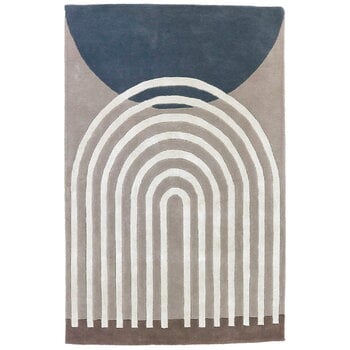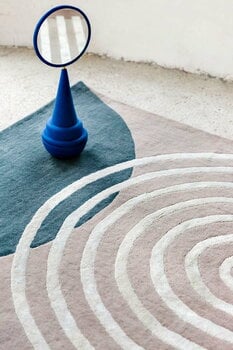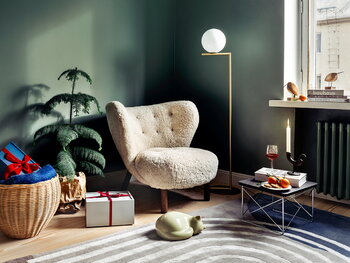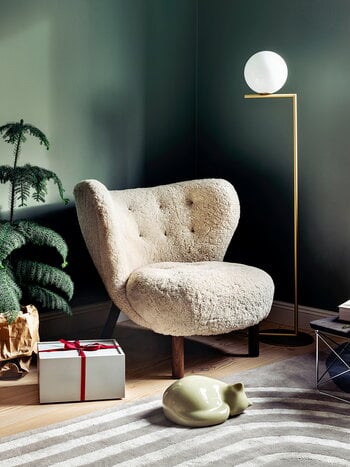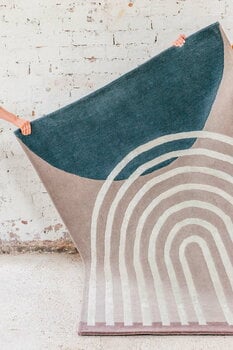Finarte’s Atrium rug features an abstract pattern inspired by beautiful architectural details that have caught the eye of the designer, Studio Smoo’s Marianne Huotari, during her travels: arches and marble fountains located in inner court-yards. Made of tufted wool and viscose, the tactile rug has a luxurious feel under your feet.
Atrium rug, grey
Finarte
Description
Finarte’s Atrium rug features an abstract pattern inspired by beautiful architectural details that have caught the eye of the designer, Studio Smoo’s Marianne Huotari, during her travels: arches and marble fountains located in inner court-yards. Made of tufted wool and viscose, the tactile rug has a luxurious feel under your feet.
Product details (8)
- Material
- 65% wool, 20% viscose, 15% cotton (base)
- Colour
- Grey, dark blue, white
- Length
- 200–300 cm
- Width
- 140–200 cm
- Yarn height
- 7 mm
- Weight
- 9.8–20.8 kg
- Notes
- Custom sizes available through our Customer Service (max. 300 x 900 cm).
- Care instructions
- Vacuum pilewise. Professional cleaning.
- Product ID
Designer
Marianne Huotari is a Finnish ceramic and textile artist known for her open-minded approach to combining different materials and forms. Her works reflect her deep respect for natural materials, sustainable design and Finnish traditions – which she interprets in fresh, new ways in her designs. Huotari works as an artist at the Arabia Art Department and as an art director for the Finnish brand Finarte, previously also heading her own brand, STUDIO smoo.
View all productsReviews (1)
4
Based on 1 reviews
-
A
anonyymi
Finland
Muutaman päivän kokemuksella voin suositella tuotetta. Tyylikäs matto, upeat värit ja miellyttävän pehmeä. Nukkaantumisesta ei voi lyhyen käyttöajan perusteella lausua mitään. Jonkin verran villahaituvaa irtoaa matosta, mutta se lienee normaalia uudelle matolle.
152 days ago
Sustainability
The Product Sustainability Framework, our criteria of sustainable design, helps you find the most sustainable products in our selection. Read below which sustainability criteria this product has met.
Working conditions & labour 7/9
-
Equal opportunities for all employees
-
Commitment to UN Global Compact, fair compensation for all employees
-
Corporate responsibility requirements defined and communicated for suppliers
-
Systematic work for improved inclusion and well-being in the workplace
-
Transparent supply chain
-
Suppliers' compliance to a code of conduct ensured
-
Support for community involvement in the supply chain
-
Direct suppliers audited and certified
-
Compliance to the UN Guiding Principles on Business and Human Rights ensured in the supply chain
Eco-friendly production 6/9
-
Fair and resource-wise water-use in production
-
No incineration or landfilling of returned items
-
No use of endangered species as materials
-
No direct environmental emissions or waste (excl. GHGs) from production
-
Material-efficient and ecological packaging
-
No potentially harmful chemicals used in own production
-
The sustainability of direct suppliers' production is addressed and monitored
-
Production and material sourcing that respect biodiversity, animal rights, and natural ecosystems
-
Positive impact on nature’s well-being through operations that regenerate natural ecosystems
Climate impact 4/8
-
Company's direct greenhouse gas emissions identified and commitment to reduction
-
Product's carbon impact identified and commitment to reduction
-
Guidance on energy- and eco-efficient use of the product
-
Carbon footprint of the product calculated and goals set to reduce it
-
Contribution to climate initiatives beyond the brand’s direct operations
-
Low-carbon or compensated transportation
-
100 % renewable energy in own production and operations
-
Carbon neutral or carbon negative product
Sustainable materials 5/6
-
Sustainable and long-lasting material choices
-
No harmful or hazardous substances
-
Responsible raw material sourcing and production
-
Materials suited for circularity: monomaterials, recyclable finishings, renewable or recycled contents etc.
-
Ecological materials: natural, biodegradable, recyclable or recycled contents
-
Outstanding materials in terms of innovativeness, responsibility, sustainability and circularity: local production or sourcing, 100 % recycled content, C2C-certification etc.
Circular design 5/5
-
High aesthetic quality promoting long-term use of the product
-
Technically durable product design and material choices
-
Design for enduring life-long quality
-
Design and support for product maintenance, repair and upgradability
-
Innovative circular design solutions: circular service system, resale platform, remanufacturing, collection of used products, etc.

